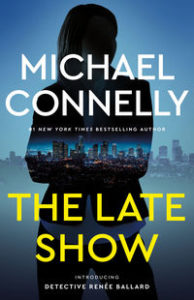Michael Connelly: The Late Show
 Michael Connelly has seamlessly launched a new character and series, introducing Detective Renee Ballard. Ballard works “The Late Show,” or the overnight shift, and she’s in a bit of purgatory as she’s accused her former boss of sexual harassment. When the charges went nowhere (her old partner didn’t back her up), she was booted to the Late Show, where she catches cases but isn’t able to follow them through to a conclusion. She instead turns them over to the pertinent department – homicide, robbery, etc. She’s feeling the lack of follow-through – she’s not as engaged in her job and her partner, who works the late shift to get home and care for a wife with cancer, doesn’t have the same focus she does.
Michael Connelly has seamlessly launched a new character and series, introducing Detective Renee Ballard. Ballard works “The Late Show,” or the overnight shift, and she’s in a bit of purgatory as she’s accused her former boss of sexual harassment. When the charges went nowhere (her old partner didn’t back her up), she was booted to the Late Show, where she catches cases but isn’t able to follow them through to a conclusion. She instead turns them over to the pertinent department – homicide, robbery, etc. She’s feeling the lack of follow-through – she’s not as engaged in her job and her partner, who works the late shift to get home and care for a wife with cancer, doesn’t have the same focus she does.
 Every couple years the “public” rediscovers Agatha. As there’s a new film of Murder on the Orient Express due in the fall, non-crime readers have been looking for that particular book. In general, however, Christie remains our bestselling author as her appeal is timeless. I was thinking about the innovations she brought to crime fiction and thought about her plots, for which she is justly famous.
Every couple years the “public” rediscovers Agatha. As there’s a new film of Murder on the Orient Express due in the fall, non-crime readers have been looking for that particular book. In general, however, Christie remains our bestselling author as her appeal is timeless. I was thinking about the innovations she brought to crime fiction and thought about her plots, for which she is justly famous. Murder with a Twist; Killer Cocktail; and A Perfect Manhattan Murder.
Murder with a Twist; Killer Cocktail; and A Perfect Manhattan Murder. Forget retirement. Gamache is now head of the ENTIRE Surete. After the events of the last novel, Gamache has taken on corruption on a larger scale – he’s literally moved on from the academy to the world at large. Penny, as always, skillfully layers her story. In this outing, she jumps between Gamache’s testimony at a trial, a murder in Three Pines, and the Surete’s – and Gamache’s – fear of the drug crisis, specifically the opioid epidemic and how best to fight it. While Julia Keller’s new book (Fast Falls the Night) also focuses on the opioid epidemic, she goes for the personal; Penny goes for the epic. Keller’s view is far more pessimistic than Penny’s ultimately optimistic one.
Forget retirement. Gamache is now head of the ENTIRE Surete. After the events of the last novel, Gamache has taken on corruption on a larger scale – he’s literally moved on from the academy to the world at large. Penny, as always, skillfully layers her story. In this outing, she jumps between Gamache’s testimony at a trial, a murder in Three Pines, and the Surete’s – and Gamache’s – fear of the drug crisis, specifically the opioid epidemic and how best to fight it. While Julia Keller’s new book (Fast Falls the Night) also focuses on the opioid epidemic, she goes for the personal; Penny goes for the epic. Keller’s view is far more pessimistic than Penny’s ultimately optimistic one. I have a real respect for writers who pull off the feat of condensing a book into the space of a single day. One of my favorite mysteries, Ngaio Marsh’s Night at the Vulcan (1951), takes place in the space of a single night, and while Ms. Keller is far removed from Ms. Marsh in time, theme, setting, and protagonist, they share a knack all good storytellers have. I think it’s a matter of pacing, the right amount of being invested in the characters, and some sort of indefinable magic. Marsh’s stories are lighter and more optimistic than Keller’s, who sets hers in a far more brutal time and place.
I have a real respect for writers who pull off the feat of condensing a book into the space of a single day. One of my favorite mysteries, Ngaio Marsh’s Night at the Vulcan (1951), takes place in the space of a single night, and while Ms. Keller is far removed from Ms. Marsh in time, theme, setting, and protagonist, they share a knack all good storytellers have. I think it’s a matter of pacing, the right amount of being invested in the characters, and some sort of indefinable magic. Marsh’s stories are lighter and more optimistic than Keller’s, who sets hers in a far more brutal time and place.